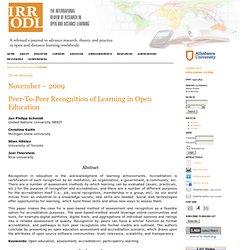

Cooperative Learning in Distance Learning: Research to Practice. Researchers and education specialists endorse the view that student learning can be maximized, thus academic performance improved, by developing a sense of "we are all in the same boat together," a basic tenet of cooperative learning (CL).
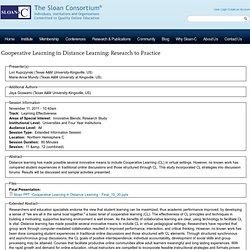
The effectiveness of CL principles and techniques in building a motivating, supportive learning environment is well known. As the benefits of collaborative learning are clear, using technology to facilitate CL is vital. Distance learning has made possible several innovative means to include CL in virtual pedagogical settings. Researchers have reported that group work through computer-mediated collaboration resulted in improved performance, interaction, and critical thinking. However, no known work has been done comparing student experiences in traditional online discussions and those structured with CL elements. Untitled. Ijlm0102_shaffer_website2. Pedagogy, Technology and Student as Producer « Expedient Means. I was recently asked to present a paper to the university’s Teaching and Learning Committee about the role of technology in the context of Student as Producer.
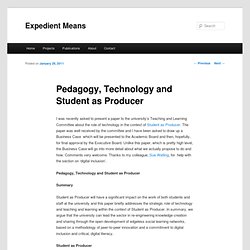
The paper was well received by the committee and I have been asked to draw up a Business Case which will be presented to the Academic Board and then, hopefully, for final approval by the Executive Board. Unlike this paper, which is pretty high level, the Business Case will go into more detail about what we actually propose to do and how. Comments very welcome. Thanks to my colleague, Sue Watling, for help with the section on ‘digital inclusion’. Pedagogy, Technology and Student as Producer Summary Student as Producer will have a significant impact on the work of both students and staff at the university and this paper briefly addresses the strategic role of technology and teaching and learning within the context of Student as Producer.
2004-10. OER in the K-12 Classroom. Course developer and facilitator: Karen Fasimpaur Preferred contact methods: email: karen at k12opened dot com chat or skype by appointment online office hours - TBA We will also be having several synchronous web sessions, schedule to be announced. Webinar #1 - Where OER hang out This webinar will highlight some premiere OER sites and will give quick tours of each. Participants will hear from the site organizers and will be invited to ask questions and make suggestions. Schmidt_Education_FreeCulture_25Oct2009. Symposium for the Future » It is easy to fall in love with technology… (by danah boyd) It is easy to fall in love with technology.
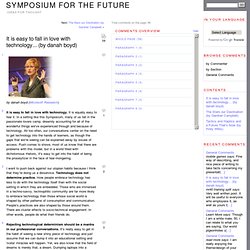
It is equally easy to fear it. In a setting like this Symposium, many of us fall in the passionate lovers camp, dreamily accounting for all of the wonderful things we've experienced through and because of technology. All too often, our conversations center on the need to get technology into the hands of learners, as though the gaps that we're seeing can be explained away by issues of access. Push comes to shove, most of us know that there are problems with this model, but in a world filled with dichotomous rhetoric, it's easy to get into the habit of being the proselytizer in the face of fear-mongering. I want to push back against our utopian habits because I think that they're doing us a disservice. Rejecting technological determinism should be a mantra in our professional conversations.
There are also no such things as "digital natives. " As we talk about the wonderfulness of technology, please keep in mind the complexities involved. 2006_KBTheory. When Professors Print Their Own Diplomas, Who Needs Colleges? - Technology. By Jeffrey R.
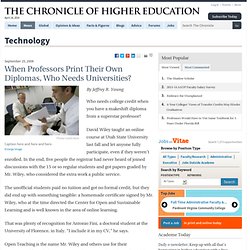
Young Who needs college credit when you have a makeshift diploma from a superstar professor? David Wiley taught an online course at Utah State University last fall and let anyone fully participate, even if they weren’t enrolled. In the end, five people the registrar had never heard of joined discussions with the 15 or so regular students and got papers graded by Mr. Wiley, who considered the extra work a public service. The unofficial students paid no tuition and got no formal credit, but they did end up with something tangible: a homemade certificate signed by Mr.
That was plenty of recognition for Antonio Fini, a doctoral student at the University of Florence, in Italy. Open Teaching is the name Mr. The name Open Teaching is a reference to “open courseware,” an idea cooked up by the Massachusetts Institute of Technology in 2001, when officials there pledged to make lecture notes and other materials for every course free online.
Now Mr. What iPods Teach Colleges Mr. Carl R. Rogers, Freedom to Learn (1969) Personal Thoughts on Teaching and Learning (1952) I wish to present some very brief remarks, in the hope that if they bring forth any reaction from you, I may get some new light on my own ideas. a) My experience is that I cannot teach another person how to teach.
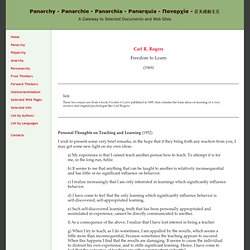
Discover Yourself! Yochai Benkler. Knowles' andragogy: an angle on adult learning. Malcolm Knowles' "Andragogy" (supposedly the adult equivalent of "pedagogy") is a leading "brand" in adult education theory: Andragogy assumes that the point at which an individual achieves a self-concept of essential self-direction is the point at which he psychologically becomes adult.
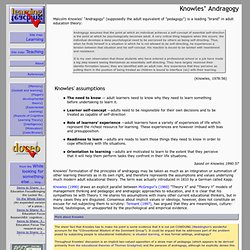
A very critical thing happens when this occurs: the individual develops a deep psychological need to be perceived by others as being self-directing. Cultivating%20Communities%20of%20... Sharing Nicely. Peer-To-Peer Recognition of Learning in Open Education. Jan Philipp Schmidt United Nations University MERIT Christine Geith Michigan State University Stian Håklev University of Toronto Joel Thierstein Rice University Abstract Recognition in education is the acknowledgment of learning achievements.
